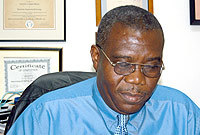

East at 5 to 10 knots.
Slight to moderate with a wave height of 2 to 4 feet.

Participants in this year's annual Congress of the World Meteorological Organisation (WMO), recently held in Geneva, Switzerland, discussed how climate change will adversely affect all societies.
Cayman Islands Senior Manager for Meteorological Services, Fred Sambula, sponsored by the Chief Secretary's office, attended the congress as the alternate to the lead delegate of the British Caribbean Territories delegation, along with other directors of the Caribbean Meteorological Organisation.
"Climate change and the associated global warming," commented Mr Sambula, "is changing the intensity and frequency of storms; droughts and fire; raising the level of the oceans; and melting glaciers."
"It's important for Cayman, as a small island state, to be represented at this important congress," he said, "especially as we are the only British Territory Island in the Caribbean that has a weather forecast office. Decisions made at this congress influence things like resource mobilisation, and training at the global and regional levels."
In addition, he said that developing and least developed countries need to have adequate infrastructure and human capital if they are to effectively use their national services and products to monitor climate change, and its associated socioeconomic impacts.
During the congress, participants noted that the industries in island states that are most affected by climate change, are tourism and finance; agriculture; and health.
Tourism and Finance
For most forms of tourism, climate is a basic resource. Extreme weather conditions caused by global warming or climate change can affect tourism, hence affecting the finance sector.
Mr Sambula highlighted that these 2 sectors are extremely sensitive to impacts of climate change. "With rising sea levels already being noted, beaches on low-lying Islands are at risk - especially during a tropical storm or hurricane threat, where higher levels of storm surges will occur."
However, he continued, by establishing sustainable tourism development programmes, we can help improve this sustainability of these sectors by providing necessary information for the safe, profitable operation of facilities and activities.
Agriculture
Agriculture - both forestry and livestock - is also an important industry. It too can be adversely affected by climate change and global warming, because weather determines what crops can grow, as well as when and where it can be grown.
"Climate change, on a global as well as local basis, has a direct relationship to food security and scarcity, if areas where most of the world's food is grown should be impacted negatively through things like drought and extreme temperatures," Mr Sambula said.
The WMO addresses the effects of climate and climate variability on agriculture and forestry through various programmes; however, "each country's contribution to global warming can potentially determine the outcome of these programmes," he added.
Health
In small island-states like Cayman, hot weather can contribute to increased morbidity and mortality. However, there are sophisticated meteorological systems used to alert health officials of extreme weather, so they can warn the public.
"Now is the time to start considering these implications," said Mr Sambula. "As weather can play a significant role in health and human services, our medical facilities should prepare to treat any sickness that arises out of these extreme conditions."
"Although the Cayman Islands don't contribute much to global warming," continued Mr Sambula, "its impact on small island developing states, like ours, can be more acute than larger countries."
Further underscoring the global importance of climate change, and the repercussions upon economies and sustainable development, high-level officials such as ambassadors and ministers attended the congress as part of their nations' delegations.
The WMO is a specialised agency of the United Nations (UN). It is the UN's authoritative voice on the state and behaviour of the Earth's atmosphere; its interaction with the oceans; the climate it produces; and the resulting distribution of water resources.